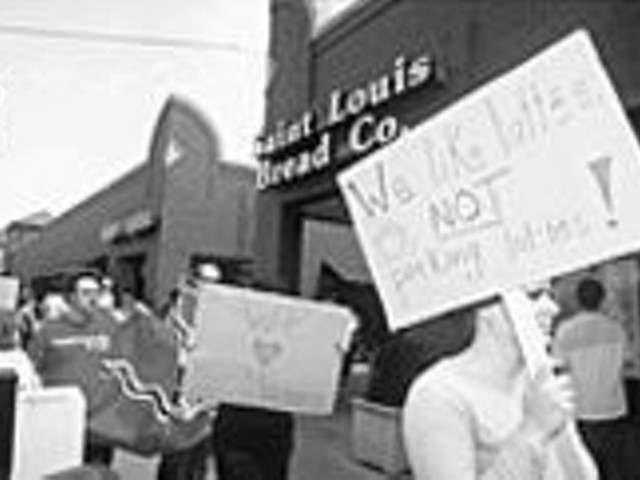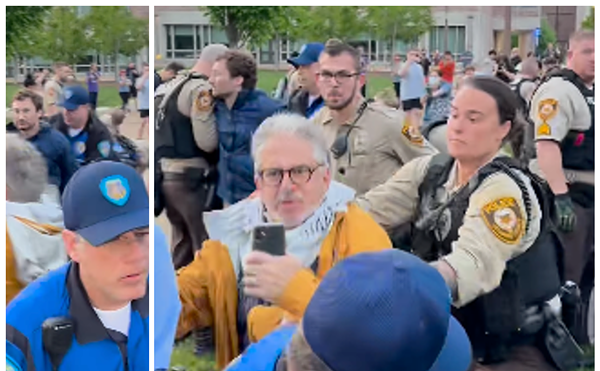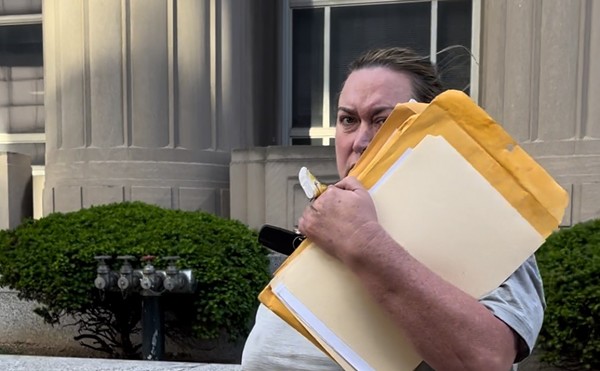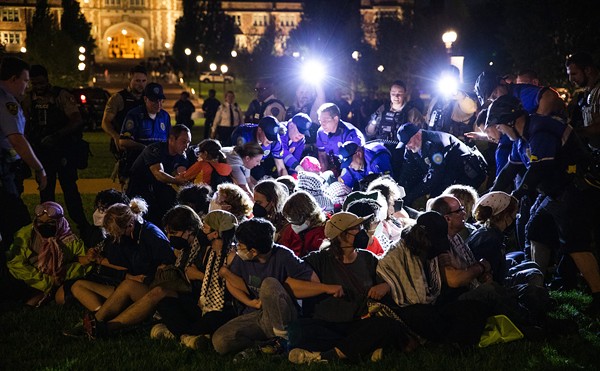Over a misdemeanor.
Bridgett Harris, 28, was charged with two counts of third-degree assault after raising welts on the backsides, torsos and arms of her sons, LaCharles Harris, 9, and LaVell Monger, 10, with an orange plastic belt. The boys' father, Charles Harris, no longer lived with them; he happened to come over, found them crying and, in anger, called the police, but he later refused to testify against his estranged wife. "I just thought there was counseling that should have been involved," he says now, admitting he never expected to wind up with his wife on trial and the kids living with him.
"It appears that the state has gotten overly zealous in going after spanking cases," remarks public defender Philip Dennis, just loudly enough for the jurors to hear. Missouri's assault law does make an exception for "discipline," provided the adult believes force is necessary "to promote the welfare" of the child and does not risk extreme pain or emotional distress. But Edmund J. Postawko, head of the St. Louis circuit attorney's family-violence unit, and Philippa E. Barrett, chief misdemeanor officer, both believe Harris hit her sons intending to injure them, not just teach them a lesson. The daisy pattern on the belt actually left an imprint on the boys' skin -- photos had been passed around the jury box -- and Postawko is disturbed by Harris' decision to use an object instead of her hand and use it in places other than "the traditional on-the-butt, which, fortunately, is pretty resilient."
The jurors don't know what to think. Every hour or so, they send out another question: Can they see the belt again? Can they change the prescribed punishment for third-degree assault (up to 100 days' incarceration and up to a $1,000 fine, or both)? Finally, and most urgently, can they talk to the defendant themselves?
Matt Potter, a brand-new assistant circuit attorney who was handed this case as his first trial, muses over the jury's questions, trying to figure out which way they were going. On the other side of the aisle, Harris sits quietly. Everybody on the jury is over 35 -- she'd marked that at the outset -- and she can't read the looks in their eyes. They don't know she'll lose her job as a nurse's aide if she is convicted. They don't know the boys' father. They don't know how much she loves her kids.
Sometime after noon, the jurors file back into the courtroom, several of the women weeping, and pronounce Bridgett Harris not guilty. Now can they please talk to her?
Standing in the hall just outside the courtroom, a dazed Harris answers the jurors' rapid-fire questions -- "Was this the first time? Do you beat your kids?" -- then pours out her side of the story, details of which the jury never heard: How she'd finally gotten an order of protection against Charles Harris and gathered the courage to kick him out in 1999. How their home was condemned last June and she and the boys were homeless for the rest of the summer, staying with a succession of friends and relatives. That's when the boys really started misbehaving, she says; she'd be at work, and they'd be home with people who played with them half the time and then tried to discipline them, and they'd laugh or disappear. "I'd say, 'Did you all do this?' and they'd say, 'LaLa let us,' and I'd say, 'Well, why didn't you stop when she told you to stop?' and they'd say, 'I dunno.' These were boys who used to ask me if it was OK even just to go across the street to the park!"
By August, they were staying in the Peabody projects with Charles Harris' cousins, and Bridgett Harris knew their welcome was tenuous. On Aug. 8, she came from the nursing home where she worked to find the boys squirting water "like they were outside" with the hose from the kitchen sink. "I asked them what they were doing, and they said, 'I dunno,' and walked away like I wasn't their mother. I went outside after them, and they mouthed off, and I said, 'That's it -- get the belt.'" She just "lost it," she admits to the jury, adding that some of the blows landed wild because the boys were trying to get away from her.
"After I sent them upstairs, Charles pulled up to pick up his cousin, and she went outside and told him he needed to talk to his sons, 'cause they just got a whuppin' and they never did what they were told. He was mad, because his own relatives had been calling him telling him to do more with his kids. He came in and went upstairs, and then he came down and said, 'I'm calling the police.'"
The next thing Harris knew, police officers were snapping handcuffs on her and her kids were screaming hysterically to let their mama go.
"I don't think their father had any idea all this would happen," she remarks, her face a mix of emotions that might have included amusement if she hadn't been separated from her kids for more than eight months. "They have a little anger in them," their father concedes now. "It comes and it goes. I don't do much to chastise them; I keep them busy with sports."
The jurors linger for nearly an hour, talking to Harris, while the bailiff guards the oddly intimate little assembly. Soon there is laughter, and bits of life are exchanged: "I broke a $500 coffee table," one man recalls ruefully; another says, "I tore up every toy I had"; another tells a story about "one of those rocking horses, cast-iron."
Joan Soaib, a good-natured, matronly juror who has already advised young Potter to work on his eye contact, steps away from the cluster. "There were three holdouts," she confides, "and I was one of them. I just could not say 'Innocent.' If a kid does wrong, you yell at 'em, you scream at 'em -- but she said, 'Get the belt.'" She sighs. "What changed my mind was the question of intent -- that, and it made no sense to put a mother in prison."
Eventually the jurors' preordered pizza arrives, and the bailiff sets it up buffet-style. The only tension left in the courtroom is the choice between pepperoni and Canadian bacon. Harris, her tears dried but the salt still streaky on her smooth brown skin, sits down with the jurors who have made it possible for her to work again in health care and get her kids back, be a mother again -- better, with any luck, this time.
Soaib comes up to say goodbye and squeezes her arm: "Now, you behave yourself, young lady! We've given you a second chance. All these services that are out there, take advantage of them. They've got after-school programs, they take the kids on outings...."
Another woman steps up and says softly, "If you ever need a church, St. Matthew's Church on Moffatt Avenue, that's my church."
The blonde juror who'd been the last holdout finally stops crying. She'd worried that she was letting Harris' kids down, and Harris assures her this isn't true; her trial has taught her lessons she'll never forget.
When most of the jurors are gone, Harris takes a deep, shaky breath and accepts a sliver of pizza. "Everybody says, 'Why don't you leave while it's going on?' Well, actually, it's a scared thing, that this man might come back and kill me," she says suddenly. "Once you get the strength, you decide, 'One more lick, and I'm gone.' It was my kids who gave me that strength. I looked at them and thought, 'My mother went through this, and now I am, and when they grow up, my sons are going to think it's OK to treat a woman like this."
She says she left her husband to end that cycle -- but found herself still spinning, caught in a circle within the circle: "If they thought whippin' with a belt was a beating! I got beat with sticks by my mom. All of us had different fathers -- oh Lord, it's a long story. She had a boyfriend, always had a boyfriend, and she'd be at work, and if he told me it was my turn to wash the dishes and I said it was my brother's turn, my mom'd listen to her boyfriend."
To this day, her father's solution to LaVell's behavior is to "take him down to juvenile and leave him there as an example," adds Harris. "I said, 'You can't do that kind of stuff anymore.' That's something I learned in parenting classes: Talk to the child, find out why he's doing what he's doing."
She took those classes at the Family Resources Center last fall, by order of the juvenile court. She says she learned all sorts of ways to discipline a child without hitting or screaming at him, and she sounds excited, listing the ideas. Then she falls silent and looks panicked: "The thing I fear now is, once my kids come back home and it comes back to me to discipline them, are they going to think if I take the Nintendo away they can call DFS? Will they think I'm afraid to discipline them at all? Because before I let my sons be a menace to society, I would die first.
"My 9-year-old, that's all he knows," she continues, the words tumbling now. "His father got into trouble, his father didn't graduate from high school, and he thinks it's cute that his son wants to grow up to be like him. When that McDonald's commercial came on with the kid on his bike, and his friends said, 'Where are you going?' and he flipped his hat around so you could see the logo and said, 'I'm going to work,' my oldest son said, 'Mama, when I'm 16, I'm gonna get a job and help you,' and LaCharles said, 'I'm not going to work. I'm gonna hustle like my daddy.' I constantly tell him, 'The world don't owe you nothing -- you owe the world.'
"LaVell is quiet; he acts like me when I was a child," she continues. "I try to tell them keeping stuff in just hurts you, but he's a very timid child, holds everything in till he can't do it no more, then he'll break down. He's smart, and he can be sneaky; LaCharles, he's gonna do it up front and center. LaVell loves school -- if he could go every day, including Saturday and Sunday, he would. LaCharles, he looks just like me. He's thick; he's not no skinny child. And he's a typical boy. He's bad -- take that back -- he's active. I used to hold him up in the air and he'd just jump and wiggle -- now, two seconds into a video game and he'll hop up. He does things for attention, and he does have a temper. His counselor told me not to listen if they said to put him on Ritalin, because her little boy was like that too and now he's a computer programmer."
Earlier this year, LaCharles' teacher said he was an amazing dancer, really talented, if he could only get the energy out the right way. Harris talks about that now, wondering aloud that her boy's got real talent and she never even knew, she was just so busy figuring out how to pay the bills. "Now I know that doing things bad is how they show they need some attention," she says ruefully. "With LaCharles, you have to find out what he's interested in. That's what I'm going to start doing once I get them back. But if you would've asked before last August, I wouldn't have been able to tell you any of this. I knew nothing about disciplining a child, nothing about communicating with a child. I didn't even know there were parenting classes! Now I have cousins and friends calling me and asking me what to do. I'll say, 'Here's a number you can call' or 'I would do this,' and then I call my DFS worker and say, 'Here's the answer I gave, and you tell me if it was right.'"
The last of the jurors, a tall, thin, gray-haired man with kind eyes, is waiting to say goodbye. "Lots of luck to you, young lady," he murmurs. "Take care of them kids." She smiles back at him and promises to try.





